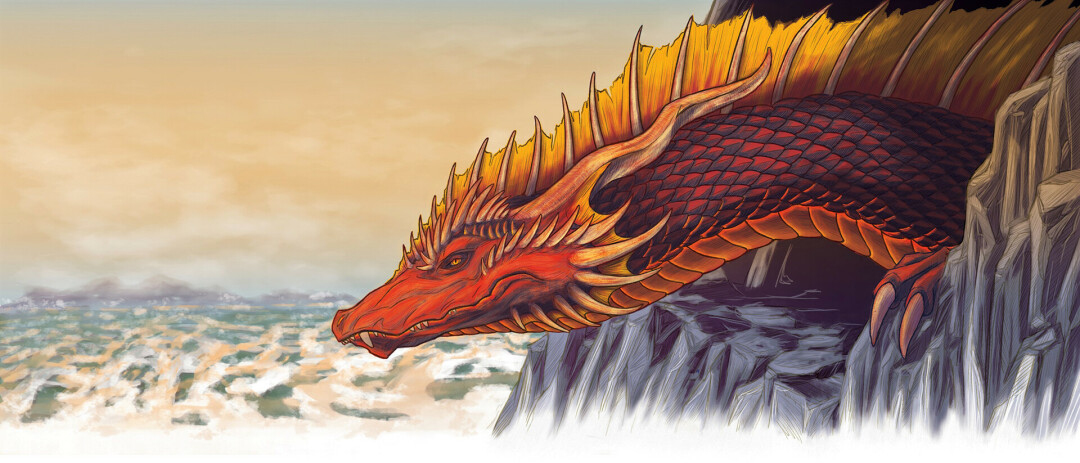COLUMN: Venturing Into the World of Dungeons & Dragons
nine-year-old adventurers, a 31-year-old editor, a longtime storyteller, a handful of dice, and a little bit of magic – that’s all it takes to build community
BJ Hollars, illustrated by Alyssa Alcorta |

A gnome, an elf, a dwarf, a wizard, and a former student walk into my dining room.
(No joke. This is how I’m spending my Saturday.)
I, Tundle Ravensbeak (a gnome) am prepared to embark upon my first session of Dungeons & Dragons. To my right sits Thorn Frostbeard (a fourth-grade dwarf), followed by Tethryian (a fourth-grade wizard), followed by Alton Trellis (an elf, who happens also to be my nine-year-old son Henry). Completing the circle is our Dungeon Master, 31-year-old James, whom I first met in the creative writing classroom a decade ago, and who has graciously agreed to lead us on our first journey.
Thorn and Tethyrian, Henry’s buddies, have no idea what they’re in for. None of us do. Except for James, who’s spent days devising the world we will now enter.
”
In the world of Dungeons & Dragons, Brute strength is never enough.
Or wisdom. Or intelligence. Or dexterity, or charisma, or constitution. In this world, every attribute has value, and no single character possesses them all. And so, the gnome must rely upon the dwarf, who relies upon the wizard, who relies upon the elf.
“Welcome to Silvermist,” James says, “a farming town on the edge of a forest. Rumor has it that a dragon has returned to the land…”
Henry – forgive me, Alton – shoots me a look.
Did he say … dragon?
“You’ve been hired by a local Adventuring Guild to investigate the rumors,” James says. “Your mission: to explore a nearby cave in search of the dragon.”
Thorn the Dwarven Fighter, Tethyrian the Human Wizard, and Alton the Elf Rogue sit a bit taller in their dining room chairs.
“Now if there is a dragon, it might be dangerous,” James warns. “But…” he smiles, “it might also be really cool.”
Suddenly we are transported to the gnarled woods of the shadowy forest on the outskirts of Silvermist. Thorn unstraps his greataxe from his back and forges our path forward. Meanwhile, Tethryian, Alton, and I hold tight to our fire bolt spells, our shortbows, and our swords. We keep one eye aimed ahead, and the other on the writhing branches blotting out the sun.
By nightfall, our adventuring party encamps atop a cliff – not far from where we have just assisted an owlbear caught in a trap. That seemed excitement enough for one day, though in the darkness ahead, we hear the unmistakable growl of goblins.
James asks us for a stealth check, a perception check, an animal handling check. We oblige, holding our collective breaths as our dice determine our fates. Tethryian casts a fog cloud spell, while Alton pulls back his bow. I, Tundle Ravensbeak, try not to trip over my beard.
“I can’t believe we lost the key,” James hisses in a goblin voice. “How will we get back into the cave?”
(Spoiler alert: the goblins don’t make it back into the cave.)
But we do, and about three hours later—after passing through the tunnel of toxic air, swimming the subterranean river, and outrunning the lizardfolk—finally engage the green dragon in mortal combat.
Cue the sound of clashing swords, the whir of an arrow striking true. The howl from the owlbear. The death groan of a dragon.
All of it contributes to the most imagination-fueled afternoon I’ve ever known. Our journey is a success, not because we’d slain a dragon, but because James has managed a more impossible feat: persuading three nine-year-olds to care more for the stories inside their heads than the pixilated versions on their screens. I sheath my sword, run a hand through my gnomic beard, and wonder: Can we stay here forever?
We cannot; Thorn and Tethyrian’s mothers need them home for dinner.
As Henry, James, and I stack the game sheets and return the miniature figures to their bin, I reflect on the many lessons we’ve acquired in Silvermist: improvisation, problem-solving, teamwork, and trust. And that’s not all.
Turning to James, I ask the question that’s been burning hotter than dragon’s breath.
“What has this game taught you?”
“Well,” James says, “you have to be a community to play it. You can’t do it by yourself.”
Not only that, he continues, but each player must contribute their unique skills to overcome the campaign’s array of challenges.
In the world of Dungeons & Dragons, brute strength is never enough. Or wisdom. Or intelligence. Or dexterity, or charisma, or constitution. In this world, every attribute has value, and no single character possesses them all. And so, the gnome must rely upon the dwarf, who relies upon the wizard, who relies upon the elf. They must learn to lean into each other without tripping over their beards.
It’s a world worth inhabiting for a while.



















